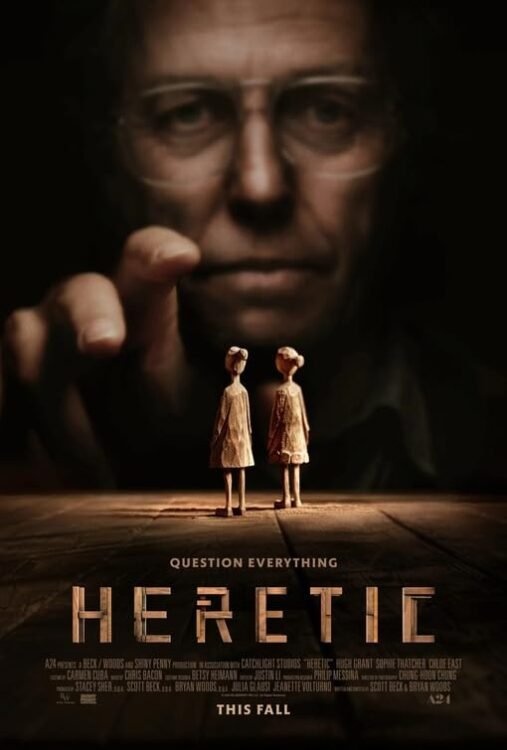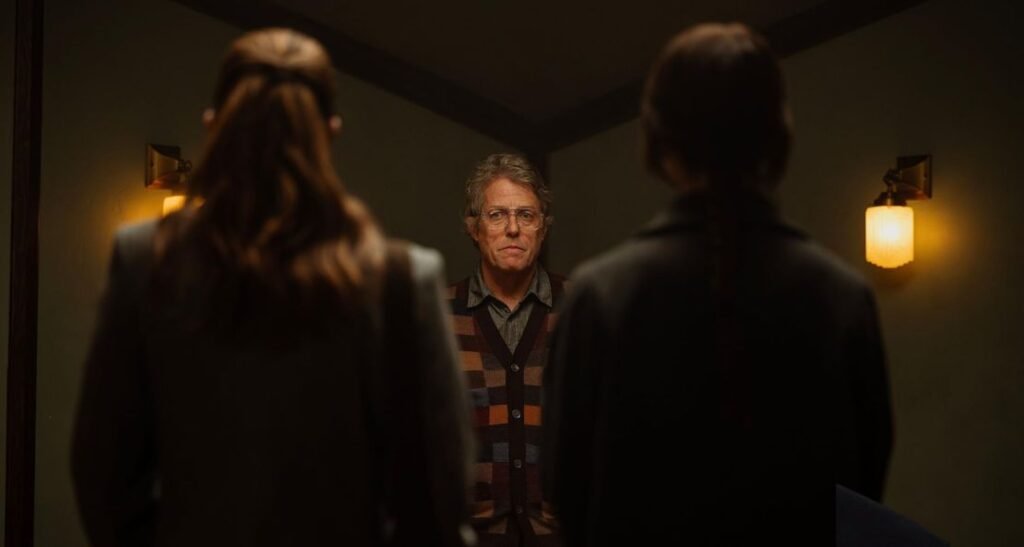Sometimes horror doesn’t come with a masked slasher or grotesque creature; it’s a soft-spoken, blueberry-pie-baking Englishman with a twisted agenda.
Heretic, the latest from directors Scott Beck and Bryan Woods, goes straight for the jugular of religious horror – and does it in a way that leaves you squirming long after the credits roll.
The plot twists and moral ambiguity are enough to give Black Mirror a run for its money, but with an extra shot of horror straight from the darker corners of human intent.
The Faith Games: Religion as Horror

If Heretic is anything, it’s a study in how religion can be twisted into something unsettling.
Here, the Mormon missionaries (played by Sophie Thatcher and Chloe East) think they’re on a typical conversion mission.
But Hugh Grant’s Mr Reed has other plans—plans that start with blueberry pie and end somewhere in the realm of madness.
Reed isn’t just an antagonist; he’s a master manipulator who sees faith as his playground.
The twisted irony? He welcomes them into his home with all the charm of a man just looking for a casual chat on the afterlife.
Before you know it, that charm is peeling away like old paint, revealing a warped scheme that pushes the limits of belief.
And the movie doesn’t tiptoe around the more disturbing implications.
It knows the trope well—religion as a moral foil—but it doesn’t stay there.
Instead, it’s about control. Reed’s “sermon” is a chaotic monologue on the failures of organised religion, delivered with a mix of condescension and wild-eyed excitement.
He’s the type who thinks he’s the smartest person in the room, and honestly, it’s unsettling enough to make you wonder if he might be right… at least until things get bloody.
Hugh Grant Goes Dark – And It’s Mesmerising

Hugh Grant as a villain isn’t brand new, but here he dials it up, setting a new bar for the phrase “cold and calculating.”
Reed isn’t an over-the-top monster; he’s the sort who’d probably debate you on theology while stirring his tea, calm as ever.
There’s something chilling about seeing Grant swap out his rom-com warmth for ice-cold manipulation. It’s a role that’s equal parts sinister and, oddly, weirdly charming.
Grant’s portrayal of Reed doesn’t come with grand gestures. He’s more the type to get under your skin with half-baked philosophies, smugly delivered.
The infamous blueberry pie scene is a testament to his twisted charm – a scene that somehow leaves you both cringing and curious.
That’s the magic of Grant here: you’re half-rooting for the guy even as he tightens the psychological noose around his guests.
Horror as a Thought Experiment: Faith, Reality, and Everything in Between
Heretic isn’t just about scaring you; it’s out to make you question things—big things like reality, belief, and where the line is between devotion and delusion.
Reed makes religion feel like a chessboard, where everyone is just a pawn in a game only he knows the rules to.
For those who like a side of existential dread with their horror, this is where Heretic really finds its mark.
The movie doesn’t go for cheap scares; it wants to unravel you from the inside out.
Reed’s constant monologues on faith play out like sermons from the world’s smuggest professor, who won’t let you escape until you’ve heard every philosophical rant in his repertoire.
But then, as soon as you think it’s getting too preachy, the blood hits the floor, and you’re reminded—this is a horror movie, after all.
The Ending That’s a Little Too Real
What would a horror film be without an ending that keeps you guessing?
Without giving too much away, the final scenes walk the fine line between life and the afterlife, leaving you to wonder whether Sister Paxton is actually seeing angels or if it’s all part of Reed’s twisted game.
This ending doesn’t serve a neatly wrapped moral. Instead, it’s a mess of “what ifs” that will probably linger in your mind for a while.
But that’s the beauty of Heretic – it doesn’t give you answers; it just stirs the pot and walks away, leaving you to deal with the chaos.
In the end, the “one true religion” Reed preaches about is as ambiguous as it is chilling.
Control, faith, manipulation – it’s all here, and the line between each is as blurred as ever.
Why Heretic Works: Depth, Not Cheap Thrills
In a world of jump-scares and formulaic horror, Heretic feels refreshingly cerebral.
It’s the kind of film that, rather than scream in your face, prefers to sit across the table, pour you a cup of tea, and let the fear seep in slowly.
And it’s in this slow-burn approach that the film really finds its voice.
The plot doesn’t rely on high body counts or grotesque visuals to keep you hooked; it’s the carefully layered tension that does the heavy lifting.
If horror is often criticised for its lack of substance, Heretic gives us a reason to reconsider.
This is a movie that uses horror as a tool to dig into the darker side of belief and power.
And in a genre that often leans on clichés, Heretic carves out a space for itself, forcing us to confront the things we might rather ignore.
So if you’re up for a horror film that’s less about monsters under the bed and more about the demons lurking in the mind, Heretic might just be your new obsession.
Just don’t go in expecting answers. This one’s all about the questions.
You might also like:
- Backstroke: The Viral Horror Sensation Beyond Netflix’s Reach
- The Truth Behind Girl in the Basement: Uncovering the Real Horror and the Filmmakers Bold Choices
- The 20 Best Foreign Horror Movies You Haven’t Watched But Should
- Succinct Yet Sinister: Exploring the Allure of One-Word Horror Movie Titles


